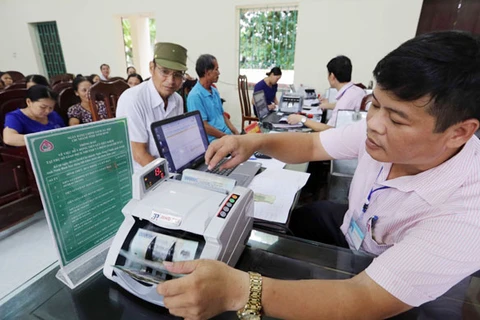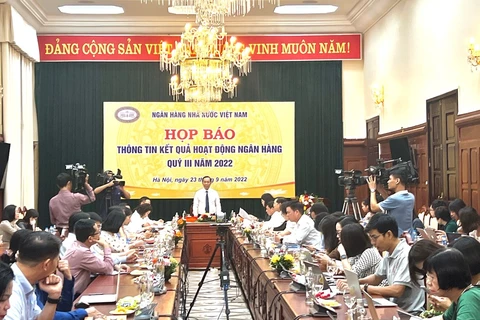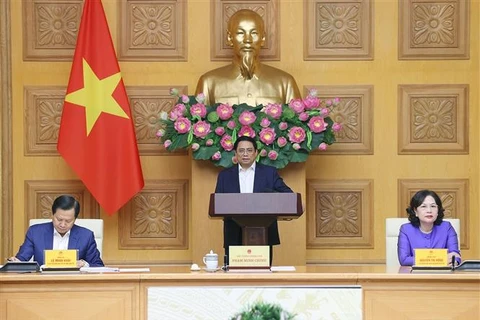 The Presidium at a seminar on credit policy in poverty reduction in central and central highlands regions (Photo: Vietnam+)
The Presidium at a seminar on credit policy in poverty reduction in central and central highlands regions (Photo: Vietnam+) Hanoi, (VNA) - The story of sustainable poverty reduction and the economic development gap between the Central and Central Highlands and regions across the country is a challenge that requires a comprehensive policy, breakthrough solutions and the provision of adequate resources as planned.
Labourers have been entitled to policy credits
According to a report of the Bank for Social Policies, after more than seven years of implementing Directive No.40-CT/TW (Directive No.40), the provision of credit under social policies has been effectively promoted, especially, the funding from the local budget entrusted to the Bank for Social Policies is increasing.
Up to now, entrusted local capital to the Bank for Social Policies has increased by 23,978 billion VND (960 million USD at current exchange rate), bringing the total entrusted capital of localities as of the end of May 2022 to 27,785 billion VND, accounting for nearly 10% of the total credit capital of the Bank for Social Policies. In particular, from the beginning of 2022 until now, the entrusted local budget to the Bank for Social Policies to supplement the loan capital totalled 3,083 billion VND.
In the context of the COVID-19 pandemic, implementing policies to support employees and employers in difficulty, the Bank for Social Policies has actively coordinated with relevant agencies to promptly provide loans to employers to pay wages to employees when stopping work and after restoring production.
From the start of implementation to the end of the disbursement on March 31, all 63 branches of the Bank for Social Policies in provinces and cities have disbursed 4,787 billion VND to 1,548 employers to pay wages for over 1.2 million labourers facing difficulties due to the COVID-19 pandemic throughout the whole country.
The Bank for Social Policies has also been disbursing credit under the Socio-Economic Development and Recovery Programme issued in Resolution 11/NQ-CP (Resolution No. 11) with more than 2,335 billion VND disbursed so far. In which, loans to support job creation are worth 2,033 billion VND with nearly 40,000 customers getting loans, creating jobs for over 58,000 employees; loans for students to buy computers and equipment for online learning worth nearly 155 billion VND with 14,500 beneficiaries; loans to buy, rent-purchase social housing, housing for workers, build new or renovate and repair houses worth over 140 billion VND with 794 customers; loans to non-public preschools and primary schools affected by the COVID-19 pandemic worth 7.6 billion VND with 90 supported institutions.
Speaking at a seminar on credit policy in poverty reduction in central and central highlands regions, Chairman of the People's Committee of Quang Nam province Le Tri Thanh said that social policy credit is considered a "bright spot" in poverty reduction policies, actively contributing to the implementation of the goal of rapid and sustainable poverty reduction, ensuring social security, and building new-style rural areas. Especially in mountainous areas, social policy credit has fundamentally changed the attitude of people, especially ethnic minority households, from reluctance and fear of borrowing to actively borrowing capital for household business.
According to Thanh, social policy credit has helped to solve basic and essential problems of life, reduce disease, illiteracy and social evils, stimulate commodity production, promote self-reliance of people and encourage them to rise out of poverty and get rich in their own homeland, contributing to repelling usury in rural areas.
However, in the process of implementing credit policies, in the mountainous areas of the Central and Central Highlands provinces, besides the great results achieved, there are still some difficulties affecting the efficiency of social credit policies, such as the ethnic minority and mountainous areas’ vulnerability to natural disasters, floods, landslides, epidemics; difficult transport affecting the consumption of goods. The local governments in some places, sometimes failed to pay due attention to the role and importance of social policy credit. There is a lack of an effective coordination mechanism between credit policy and agricultural, forestry and fishery extension programmes.
 General Director of the Bank for Social Policies Duong Quyet Thang speaks at a seminar on credit policy in poverty reduction in central and central highlands regions (Photo: Vietnam+)
General Director of the Bank for Social Policies Duong Quyet Thang speaks at a seminar on credit policy in poverty reduction in central and central highlands regions (Photo: Vietnam+) Vice Chairman of the People's Committee of Dak Lak province Nguyen Tuan Ha shared the same view and said that sustainable poverty reduction in ethnic minority areas is a major policy of the Party and State to improve the material and spiritual life of ethnic minorities, narrowing the development gap among regions and ethnic groups. Therefore, he suggested the Government give priority in capital provision to localities where there are many ethnic minority groups, contributing to narrowing the gap in development level, income and living standard between regions in the country.
At the seminar, leaders of the Central and Central Highlands provinces reported on the implementation of social policy credit in mountainous area in 2016-2021 in their respective localities, and drew out shortcomings and lessons in the process. They also proposed plans and solutions for 2022-2025, highlighting the need to link social policy credit with target socio-economic development programmes in mountainous areas and poverty reduction projects and operation models.
General Director of the Bank for Social Policies Duong Quyet Thang pointed to issues that need to be improved in the coming time, such as diversifying methods of mobilizing resources for the Bank for Social Policies to fully and promptly meet the borrowing needs of the people.
Thang also suggested that localities continue to effectively implement Directive No.40/CT-TW and Conclusion No.06/KL-TW of the Party Central Committee’s Secretariat; continue to pay attention to allocating resources from the local budget and other lawful capital sources to supplement capital for lending to poor households and other social policy beneficiaries; and direct the combination of agricultural, forestry and fishery extension programmes, vocational training, multiplication of effective production and business models, and product consumption associated with policy credit in the local socio-economic development plans./.























